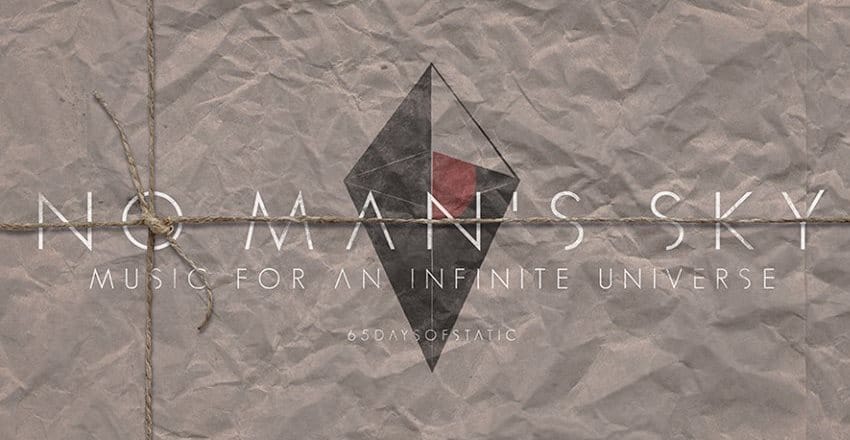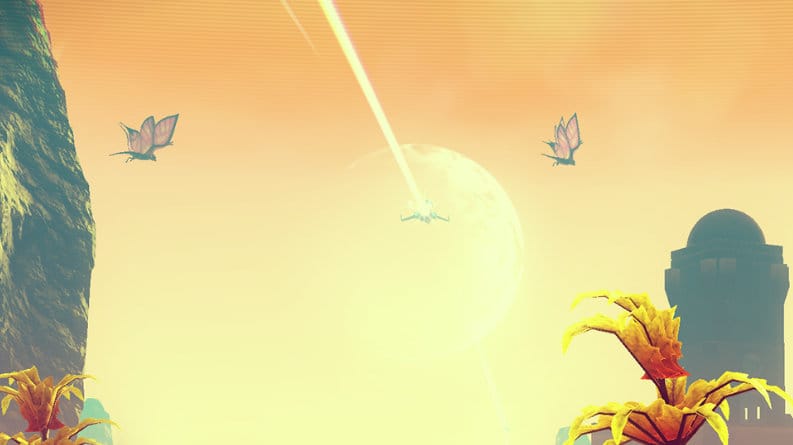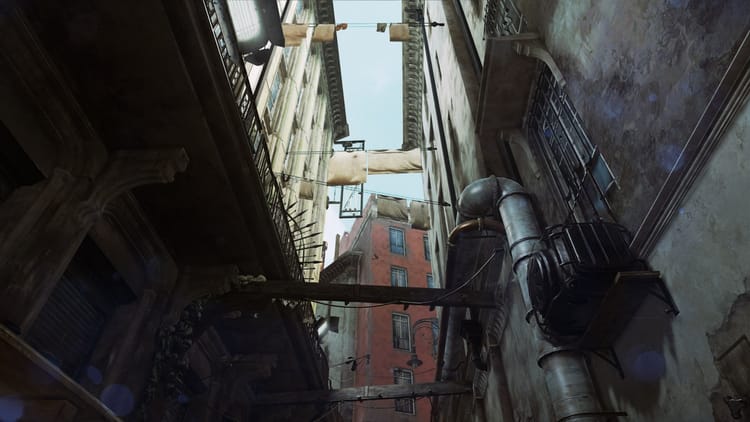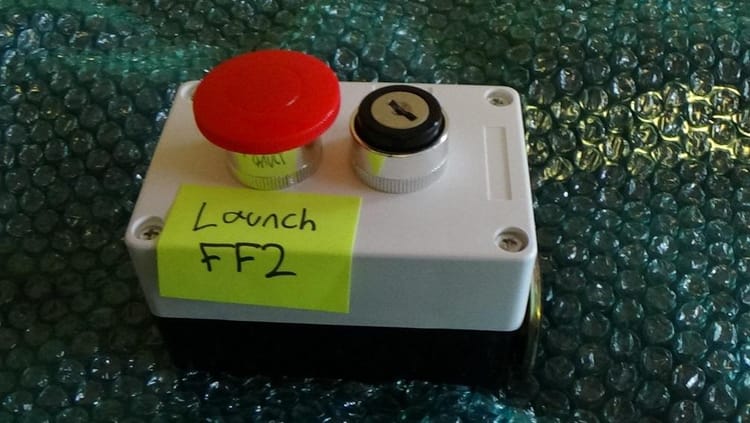The making of No Man’s Sky soundtrack

Post-rock has long been intertwined with film and television. That’s why there’s a big chance you’ve heard it before, possibly without even knowing it. Explosions In The Sky (one of the genre’s most well-known acts) blew up into mainstream consciousness after scoring the American football drama Friday Night Lights (2006-2011). Their fellow Austin residents This Will Destroy You have been heard in popular movies as well, including Moneyball (2011), World War Z (2013), and at least one ad campaign without their permission. Long-running Scottish act Mogwai (named after the furry creatures from Gremlins) most recently scored the 2015 BBC 4 documentary Storyville Atomic: Living In Dread And Promise.
So what is post-rock? It’s a genre tag that describes primarily instrumental music played within the context of a typical rock band configuration. This generally means guitars, bass, and drums, in addition to occasional electronic elements and orchestral arrangements. More defining, though, is that most post-rock bands eschew typical verse-chorus song structures, instead opting for nonlinear songwriting that often traverses subtle quiet to thunderous volume in the space of several minutes.
This structure has caused it to often be associated with classical music. In fact, genre staples Mono are renowned for their work with full orchestras. This connection to classical and orchestral music, which have long been used in film and television soundtracks, means it makes sense that post-rock is often used to provide a compelling alternative.
Videogames are no stranger to the world of classical music, either. Modern blockbusters such as Destiny (2014) effectively capture the epic scale of their worlds with classically-influenced arrangements that complement the onscreen action—an aural tradition that Bungie has carried on since releasing the original Halo (2001). The Evil Within (2014) borrowed snippets of Claude DeBussy’s “Claire de Lune” to indicate impending save points, evoking a sense of safety in an otherwise brutal environment. There’s even a growing trend of orchestras performing videogame music in an attempt to draw in new listeners. Given all this, it’s worth questioning why so few post-rock bands been asked to write full videogame soundtracks.
filling infinite space with sound
One reason for this could be due to the genre’s reliance on carefully timed tension and release—the moment of peak volume is often the listener’s payoff for their patience. Since movie and television scenes don’t change on repeated viewings, crafting soundscapes that reach their apex at just the right moments is a relatively straight-forward process. Games, on the other hand, aren’t always played in exactly the same manner twice. This presents two challenges: writing a score that accurately anticipates a player’s actions, and one that invokes an appropriate emotional response that suits the onscreen drama.
This is also partially why Guildford, UK-based independent studio Hello Games (previously known for its Joe Danger series of games) turned heads when announcing Sheffield-based experimental post-rock outfit 65daysofstatic would be crafting the soundtrack for the upcoming No Man’s Sky. The highly anticipated space game promises near-endless exploration across an effectively limitless procedurally-generated universe that will theoretically take billions of years to fully traverse. That means no set pieces, no cutscenes, and no predictable beginning, middle, or end. Building a game with such a sense of scale is unprecedented in itself. Writing a standalone soundtrack that could do it justice, filling infinite space with sound, would seem a downright monumental feat.
However, if an epic game requires an epic soundscape, then 65daysofstatic may just be the perfect fit for the job. Just as no two planets in No Man’s Sky are the same, nor are any two records in the band’s catalog, ranging from the industrial-tinged soundscapes on 2004’s The Fall Of Math, to the noisier guitar-oriented leanings of 2013’s Wild Light. They are no strangers to writing soundtracks either, having written and released an alternate score to the 1972 science fiction film Silent Running.
While 65daysofstatic’s sound falls somewhere along the post-rock spectrum, it doesn’t stick within any of the stylistic boundaries the label demands. The band is known for seamlessly blending organic and electronic instruments in a way few other acts can manage, as demonstrated by the dramatic synths and hyperkinetic rhythm section that underpin layered guitars on “Debutante” (a track from the 2010 studio album We Were Exploding Anyway chosen for the game’s official trailer). Endlessly inventive and never predictable, here’s what guitarist and co-founder Paul Wolinski had to say about what could be their most ambitious project yet: scoring a game that never truly ends.

Kill Screen: When Hello Games approached you about working with them on No Man’s Sky, what specifically hooked your interest in writing the soundtrack for the game?
They didn’t initially approach us about writing the soundtrack. They just wanted to use one of our older songs for their launch trailer. But when we saw what it was they were making, it was immediately clear to us that we wanted to get involved further. We are not active gamers, but that’s not to say we have no interest in the form or never play games, and had been paying close enough attention to that world to appreciate that there were interesting possibilities for music in that area.
KS: Was there much discussion between Hello Games and yourselves about the specific direction the music needed to take?
We’ve been given pretty much free reign, which has been flattering and intimidating in equal measure. When we first started discussing it with Hello Games, they told us that they had been using our back catalogue as inspiration and mood music during the early development phase, and that all we needed to do was write “65daysofstatic music” and it would be fine. This was easier said than done, because we never really know exactly what we are doing when we write, other than trying to sound different each time.
So perhaps the most difficult thing was to work out how to consciously look at our back catalogue, and figure out how to write something that was deliberately ‘65’ without feeling like we were wallowing in nostalgia, or relying too heavily on old tricks. From the beginning, we wanted to make sure that whatever we wrote, it worked as a standalone album we could be proud of as well as be the soundtrack to No Man’s Sky. Hopefully we’ve pulled that off.
KS: How much reference material did Hello Games provide in terms of design documents, concept art, or pre-release builds and demos you could play through?
Very little, but this was fine. One of the first exchanges we had with them about this project, they told us a little story about the launch trailer they were making. “We start underwater. It’s dark but you can make out shoals of fish swimming before you. They look strange. Alien…” They weren’t pitching us the technology of the game, the scale or ambition of the game. Not even the look of the game, as beautiful as it is.
meaning in music is contextual
What was important for them was creating that immediate, immersive experience for the player. This way of thinking was much more useful to us than spending hours playing unfinished versions of the game, or soundtracking captured gameplay footage, or whatever. We got to use our imaginations more.
KS: How did you approach writing music for scenarios that can’t necessarily be anticipated?
A lot of soundtrack work is deliberately minimal. It’s almost designed not to be consciously heard at all, to not intrude on the action. And furthermore, so much meaning in music is contextual. So, our aim was to pull out soundscape ingredients from the more fully-formed, linear songs that we wrote, and then curate and combine them to try and project a certain amount of emotion, for want of a better word, into a music bed. But at the same time, didn’t want to weigh them down with something so obvious that they’d be anchored down with an undeniable, unavoidable meaning.
This way, the context the music appears in hopefully allows the meaning to be created as a kind of collaboration between us, the game algorithms that chose these particular audio stems, and the player who is bringing their agency and own emotions to the moment that is being soundtracked. It’s tricky though, isn’t it? Because music is entirely subjective, and leaning too heavily on genre or cliché to get the desired effect can so easily have the opposite one. Sometimes sad music can make you really happy, and happy music can make you want to rip off your ears.
This explanation is about 95 percent hindsight though. At the time, it felt more like we were making-it-up-as-we-went-along.
KS: Are there any particular themes or intended emotional responses you kept in mind while writing in order to sync with what a player might encounter?
I think the main thing for us was to add a kind of grit to the experience. To accentuate the vulnerability and isolation of the player, and the hostility and brutality of space. We were less interested in soundtracking the colossal scale of a vast, infinite universe from a grand, outside perspective; we instead tried to soundtrack the visceral, immediate, but personal experience of being lost and alone somewhere inside a vast, infinite universe. If that makes sense.

KS: How much music did you have to write for this game, and is everything used in-game included on the retail release of the soundtrack?
We wrote a lot of music. It’s hard to say how much. Not everything that is in-game is included on the retail release—that would be impossible due to the nature of how the in-game soundtrack will work. But we tried our best to tailor the music to the various forms it would be heard, rather than attempt a one-size-fits-all approach.
So there’s an album of songs that are arranged in a more obvious, linear fashion. It’s about 45 or 50 minutes long. It hopefully works as a listening experience regardless of whether you have even heard of No Man’s Sky or not. Then there’s another album of more soundscape-like material. This isn’t quite like how the music will appear in the game, it’s more of a representation of how we envisaged what the soundscapes might be like, before we actually started working with Paul Weir, the audio director, to feed elements into the game. And then finally there’s the game, where the music is always happening ‘live’ and reacting to the gameplay. This music is built from the same ingredients as both the records, but probably won’t ever sound exactly like it.
KS: Can you describe the studio setup and gear used for recording?
At 65HQ (where we wrote): drum kit, more drums, a couple of good guitars, quite a lot of not-very-good-guitars, bass guitars, half a dozen amplifiers of varying quality and tone, some quite expensive analog synthesisers, some cheaper analogue synthesisers, some home-made analog synthesisers and fx modules, more guitar pedals than the number of planets in No Man’s Sky, laptops, various pieces of commercial audio software, much more interesting open source audio software, game engine software, sound design software, weird hacked-together, bug-heavy combinations of the above software we built ourselves to replicate the music logic brain of No Man’s Sky. (Our procedural music brain was a bit noisier, angrier and more inclined to techno than theirs ended up being).
the music is always happening ‘live’ and reacting to the gameplay
At Chapel Studios (where we recorded): all the above, plus a grand piano, even more amplifiers, isolation, no phone signal, wine, fancy microphones, tape machines, a pervasive existential dread, a weird organ, old school Neve mixing desk and a bunch of vintage outboard gear to add various shades of noise to everything we captured.
KS: What was the one piece of studio gear you absolutely could not have lived without in order to bring this project to life?
Coffee maker.
KS: Were there any particular types of tones or textures you aimed to capture in the studio?
I think the trajectory 65 had been on before we started work on the No Man’s Sky project was to kind of give up and form and structure and just make big slabs of noise. But that wasn’t appropriate here. So I think our intention became figuring out how noisy we could make things before it stopped feeling right as a soundtrack to No Man’s Sky. As it turned out, that still meant pretty noisy.
KS: Is there anything else you’d like to add?
Just that Hello Games are some of the friendliest people we have ever had the chance to work with, and 65 find it kind of amazing that such a tight little indie team has found a way to navigate the capitalist realism of what it means to release a game on this scale, through Sony, and yet retain complete creative control over their vision. Nice one, Hello Games!
No Man’s Sky will be released August 9, 2016 in North America and August 10, 2016 in the UK and Europe. Its soundtrack, No Man’s Sky: Music For An Infinite Universe, is available for pre-order on vinyl, CD, and digital formats here.




Comments ()